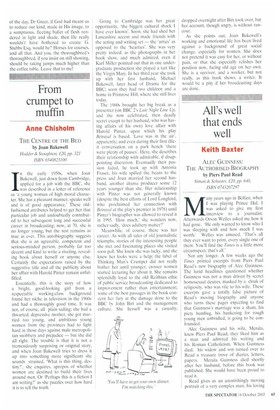From crumpet to muffin
Anne Chisholm
THE CENTRE OF THE BED by Joan Bakewell Hodder & Stoughton, £20, pp. 321 ISBN 0340823100
Inthe early 1950s, when Joan Bakewell, just down from Cambridge, applied for a job with the BBC, she was described in a letter of reference as 'a young woman of high moral character. She has a pleasant manner, speaks well and is of good appearance.' These oldfashioned attributes helped to get her that particular job and undoubtedly contributed to her subsequent long and successful career in broadcasting: now, at 70, she is no longer young, but the rest remains as true as ever. This autobiography suggests that she is an agreeable, competent and serious-minded person, probably far too decent and kind to write a riveting, revealing book about herself or anyone else. Certainly the expectations raised by the suggestive title and all the publicity about her affair with Harold Pinter remain unfulfilled.
Essentially, this is the story of how a bright, good-looking girl from a respectable working-class background found her niche in television in the 1960s and had a thoroughly good time. It was not, of course, all plain sailing; she had a thwarted, depressive mother, she got married too young, and ambitious young women from the provinces had to fight hard in those days against male metropolitan snobbery and prejudice — but she did all right. The trouble is that it is not a tremendously surprising or original story, and when Joan Bakewell tries to dress it up into something more significant she sounds strained. 'What is this thing, destiny?', she enquires, apropos of whether women are destined to build their lives around men. Or 'Perhaps this is a fiction I am writing?' as she puzzles over how hard it is to tell the truth.
Going to Cambridge was her great opportunity, 'the biggest cultural shock I have ever known'. Soon, she had shed her Lancashire accent and made friends with the acting and writing set — the 'arties' as opposed to the 'hearties'. She was very pretty indeed, as the photographs in her book show, and much admired, even if Karl Miller pointed out that in one undergraduate production she played a tart like the Virgin Mary. In her third year she took up with her first husband, Michael Bakewell, later head of Drama for the BBC; soon they had two children and a home in Primrose Hill, where she still lives today.
The 1960s brought her big break as a presenter (on BBC 2's Late Night Line Up, and the now celebrated, then deadly secret except to her husband, who was having affairs of his own) love affair with Harold Pinter, upon which his play Betrayal is based, 'Love was in the air', apparently; and even during their first illicit conversation on a park bench 'there were plenty of pauses'. Here, she describes their relationship with admirable, if disappointing discretion. Eventually their passion faded, he took up with Antonia Fraser, his wife spilled the beans to the press and Joan married her second husband. another drama producer some 12 years younger than she. Her relationship with Pinter was not generally known (despite the best efforts of Lord Longford. who proclaimed her connection with Betrayal at the play's premier in 1978) until Pinter's biographer was allowed to reveal it in 1995. 'How much,' she wonders now, rather sadly, 'does adultery matter?'
Meanwhile, of course, there was her career. As with all tales of old journalistic triumphs, stories of the interesting people she met and fascinating places she visited soon pall. She knew she was lucky, and she knew her looks were a help; the label of Thinking Man's Crumpet did not really bother her until younger, crosser women started lecturing her about it. She remains splendidly loyal to the old Reithian ethic of public service broadcasting dedicated to improvement rather than entertainment; some of the best passages in the book concern her fury at the damage done to the BBC by John Birt and the management culture. She herself was a casualty, dropped overnight after Birt took over, but her account, though angry, is without rancour.
As she points out, Joan Bakewell's working and emotional life has been lived against a background of great social change, especially for women. She does not pretend it was easy for her, or without pain, or that she especially relishes her position now, facing old age on her own. She is a survivor, and a worker, hut not really, as this book shows, a writer. It would he a pity if her broadcasting days are done.


































































































 Previous page
Previous page